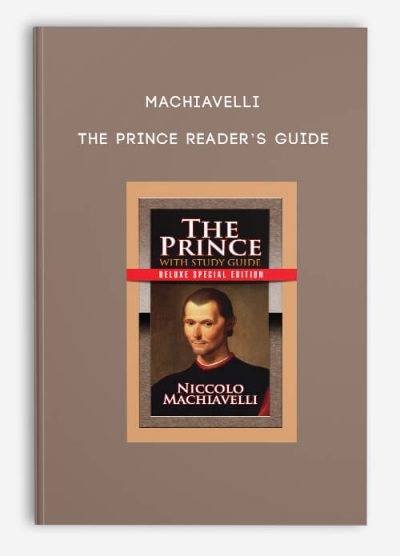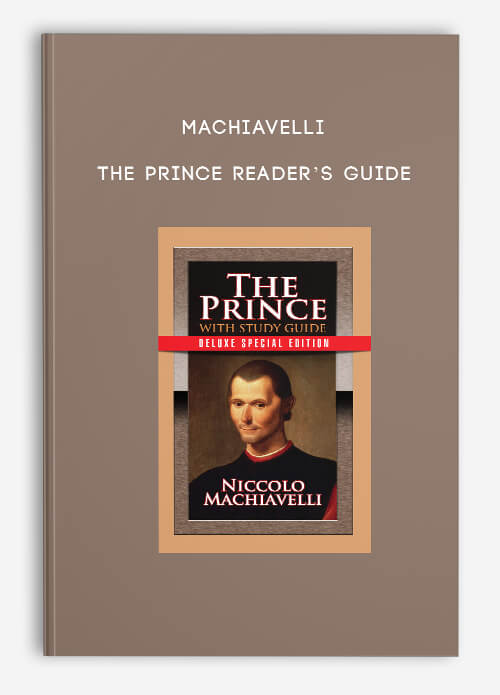The Prince Reader’s Guide by Machiavelli
$19.00
- Description
Description
The Prince Reader’s Guide by Machiavelli
**More information:
Get The Prince Reader’s Guide by Machiavelli at Bestoftrader.com
Description
Readers have differed sharply in their assessments of The Prince, as well as the character of its author, Niccolò Machiavelli, since the book’s publication in 1532. In his own time, Machiavelli was known as the author of histories, poems, and plays (including a widely produced popular comedy). Highly respected as a statesman, he represented Florence on foreign missions and wrote reports admired for their style and substance. But the Catholic Church censured Machiavelli for his criticism of Christianity and for the tone and content of the political counsel he offered, especially in The Prince. By the seventeenth century, the name Machiavelli had become synonymous with diabolical cunning, a meaning that it still carries today. Modern readers exhibit the same ambivalence about Machiavelli himself, alternately recognizing him as a precursor of the discipline of political science and recoiling from the ruthless principles he frequently articulates. Both views of Machiavelli, as innovative modernist and cynical politician, have their origins in The Prince.
Machiavelli wrote The Prince in 1513, just after he was forced to leave Florence as a political exile. Dedicated to Lorenzo de’ Medici, the book is Machiavelli’s advice to the current ruler of Florence on how to stay in power. It was also his effort, though unsuccessful, to gain an advisory post in the Medici government. The Prince was not published until five years after Machiavelli’s death. Leaders as diverse as Oliver Cromwell, Frederick the Great, Louis XIV, Napoleon I, Otto von Bismarck, and John F. Kennedy have read, contemplated, and debated Machiavelli’s ideas.
Machiavelli’s treatise makes a clear break from the Western tradition of political philosophy that preceded him. Beginning with Plato and Aristotle, the thinkers of this tradition were concerned with issues of justice and human happiness, and with the constitution of the ideal state. Until its final chapter, The Prince is a shockingly direct how-to manual for rulers who aim either to establish and retain control of a new state or to seize and control an existing one. Rather than basing his advice on ethical or philosophical principles, Machiavelli founds his political program on real-life examples. When explaining what a prince should or should not do in pursuit of his ambitions, Machiavelli cites the actions of well-known historical and contemporary leaders, both successful and unsuccessful. Throughout The Prince, Machiavelli explicitly aims to give an unsentimental analysis of actual human behavior and the uses of power. “I have thought it proper,” Machiavelli writes of a prince’s conduct toward his subjects, “to represent things as they are in a real truth, rather than as they are imagined” (p. 49).
The accuracy of Machiavelli’s view of human nature and the social world is debatable. Is Machiavelli simply being clear-sighted and objective, or is he providing spurious justifications for the worst impulses of those who seek power? In The Prince, the results of actions are what matter. Murder, the incitement of quarrels among citizens, the purchase of temporary loyalties, and betrayal: all are permissible—indeed, recommended—if they advance the prince’s goal of attaining and securing power. In Machiavelli’s view, the preservation of the state warrants such actions, since the state is necessary to ensure security, peace, and order for the people. He sets the ambitions of the prince and the need of the people for order side by side, seeing the two as complementary. Perhaps they are, or perhaps this equation is merely a self-serving way for those who crave power to defend injustices. To what extent the means that Machiavelli promotes in The Prince are justified by the ends, and whether the means actually bring about the ends, remain open questions.
Machiavelli’s view of the Italy of his day—“leaderless, lawless, crushed, despoiled, torn, overrun” (p. 83)—underwrites the advice he gives in The Prince. It also leads him to end his treatise with an “Exhortation to liberate Italy from the barbarians.” Machiavelli calls for “a new prince…to introduce a new order” (p. 82) that would bring unity and stability to the often warring city-states of the Italian peninsula. In this portion of The Prince and in some of his other writings, Machiavelli appears more idealistic and friendly toward a form of government that would give citizens a say. In his Discourses, Machiavelli portrays the ideal government as a republic that allows groups with differing opinions to speak openly.
Machiavelli thus sets the stage for an enduring discussion among his readers. Is he best understood as a seeker of unity and peace, concerned to make his advice practical and effective? Is he an opportunist offering aid and comfort to would-be tyrants? Do the moral and political goals he outlines in the final chapter of The Prince justify the actions he advocates in the preceding chapters? These questions seem destined to remain with us as long as Machiavelli’s book continues to occupy a central place in modern political thought.
















